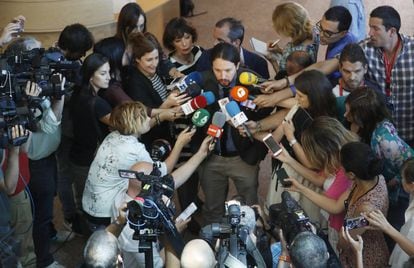Spain’s Podemos excludes media, including EL PAÍS, from press event
Affected groups criticize move by anti-austerity party, calling it unprecedented in Spanish politics
Spanish anti-austerity party Podemos on Monday excluded several news organizations – including EL PAÍS – from a press briefing at party headquarters in Madrid. The leftist political group issued invitations to reporters who regularly cover the party to attend an off-the-record breakfast event held to introduce the group’s new spokespersons.

But organizers failed to invite EL PAÍS, the Cadena SER radio network (both owned by Grupo PRISA), El Periódico de Catalunya and three other online media outlets. Their argument for doing so was that Podemos was trying to create “a space of trust.”
The Madrid Press Association (APM) issued a press release on Tuesday “deploring” the decision. The Association of Information Media (AMI) joined the criticism, noting that “the right to information is protected by Article 20 of the [Spanish] Constitution.”
An ‘El Mundo’ reporter declined to attend in protest over the selective veto
“Freedom of information should always be respected; it is proof that democracy is functioning well,” said the AMI in a statement. “Only an informed citizen can be a free citizen.”
The invitation contained the following message: “Hi! Next Monday, June 19 at 10am, we’re preparing an ‘off-the-record’ breakfast on the seventh floor of 2 Princesa street to introduce you to the new state-level spokesmen and women and to tell you about the roles they play in Podemos. The idea is for you to get to know them a little better while we share a cup of coffee.”
The invitation was received by news agencies (EFE, Europa Press and Servimedia), print media (Abc, El Mundo, La Razón and La Vanguardia), radio stations (RNE and COPE), and by numerous online dailies such as ElConfidencial.com, Eldiario.es, Público, El Español, Diario Crítico and Libertad Digital.
Losing democracy

EL PAÍS editor-in-chief Antonio Caño warned on Tuesday about the risk of seeing good journalism disappear and being engulfed by the rising tide of post-truths and fact denial.
"Traditionally, this has been known as manipulation," he said during a lecture he delivered in the Basque city of San Sebastián, at the inauguration of the Basque Country University Summer Courses.
Speaking in front of regional premier Iñigo Urkullu, Caño stated that “if we lose journalism, we lose democracy.”
But it was not sent to EL PAÍS, Cadena SER, El Periódico de Catalunya or the online outlets El Independiente, Voz Pópuli or Ok diario.
More than 15 journalists attended the event, and when some of them expressed dissatisfaction at seeing their colleagues excluded, they were told that the invitation had been selective in order to create “spaces of trust.” The reporter from El Mundo declined to attend in protest over the selective veto.
Queried by EL PAÍS regarding the reasons behind the decision, a party spokesman declined to provide any explanations.
Three months ago, Podemos had another run-in with the press after the APM received a complaint by a group of reporters who claimed that Podemos was harassing them on social media.
There is no precedent in Spain for media events – even informal ones – to leave out specific outlets. Not even in 2007, when the Popular Party (PP) decided to boycott the PRISA group over statements made by then-chairman Jesús de Polanco, did EL PAÍS or Cadena SER get left out of meetings with the media.
The move was reminiscent of the White House’s decision to block CNN, The New York Times and other major outlets from an off-camera press conference in February.
English version by Susana Urra.












































